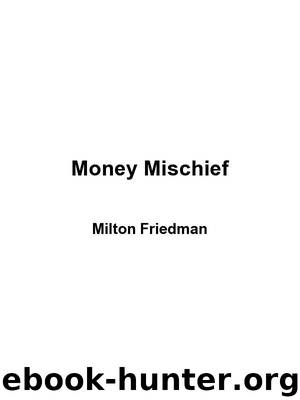Money Mischief by Milton Friedman

Author:Milton Friedman
Language: ru
Format: mobi, epub
Publisher: Houghton Mifflin Harcourt
Published: 2011-12-01T10:42:20+00:00
New Deal Action for Silver
The Democratic platform on which Roosevelt was elected in 1932 pledged a "sound currency to be preserved at all hazards," but it went on to add "and an international monetary conference called on the invitation of our Government to consider the rehabilitation of silver and related questions." The Republican platform also favored an international conference but, in a separate plank, pledged to "continue to uphold the gold standard"—shades of difference that had persisted since the direct confrontation on the silver issue in 1896. In a campaign speech at Butte, Montana, the heart of silver country, Roosevelt declared that "silver must be restored as monetary metal, and the Democratic pledge on the subject must be kept" and that "he would call immediately after his inauguration an international monetary conference to consider the rehabilitation of silver" (New York Times, Sept. 20, 1932, p. 1).
The Democratic landslide in 1932 greatly strengthened the political power of the silver bloc, especially in the Senate. Before the election, the fourteen senators from the seven states producing the bulk of the silver were evenly divided: seven Republicans, seven Democrats. The Roosevelt sweep left only two Republicans versus twelve Democrats, and one of the Republicans, William E. Borah of Idaho, had long been a staunch supporter of silver. Some leaders of the silver bloc—like Borah, first elected in 1906, and Key Pittman, first elected in 1912—had, by virtue of seniority, become highly influential in the Senate. Similarly, the farm state allies of the silver bloc gained strength.
The first test in the Senate, on an amendment to adopt the free and unlimited coinage of silver at 16 to 1, was "rejected 44 to 33, but showed a gain of 15 votes since the time when the question had been voted on in January" by the lame-duck Congress (Leavens 1939, p. 245). Obviously the silver bloc was a potent political force, which the president could hardly ignore. And, as Roosevelt had made clear during the campaign, he had no intention of doing so.
The president's response was to support an amendment to a farm relief bill that was then being proposed by Senator Elmer Thomas, who was not from a silver state but nonetheless was "a sturdy inflationist" (Leavens 1939, [>]). As finally passed, on May 12, 1933, the Thomas amendment provided for an increase in Federal Reserve notes and deposits and U.S. notes, at the discretion of the president, in an amount ($3 billion) that would have nearly doubled the amount of high-powered money. In addition, the amendment authorized the president to reduce the gold content of the dollar and gave him sweeping powers with respect to silver—powers that would, for example, have enabled him to give immediate effect to Bryan's battle cry of free and unlimited coinage of silver at 16 to 1. These powers were "hardly used until December 21, 1933, when ... President Roosevelt used the authority granted by the Thomas amendment to direct U.S. mints to receive all newly produced domestic silver offered to them up to December 31, 1937, at cents an ounce (i.
Download
This site does not store any files on its server. We only index and link to content provided by other sites. Please contact the content providers to delete copyright contents if any and email us, we'll remove relevant links or contents immediately.
International Integration of the Brazilian Economy by Elias C. Grivoyannis(111059)
The Radium Girls by Kate Moore(12028)
Turbulence by E. J. Noyes(8049)
Nudge - Improving Decisions about Health, Wealth, and Happiness by Thaler Sunstein(7707)
The Black Swan by Nassim Nicholas Taleb(7129)
Rich Dad Poor Dad by Robert T. Kiyosaki(6632)
Pioneering Portfolio Management by David F. Swensen(6301)
Man-made Catastrophes and Risk Information Concealment by Dmitry Chernov & Didier Sornette(6019)
Zero to One by Peter Thiel(5802)
Secrecy World by Jake Bernstein(4753)
Millionaire: The Philanderer, Gambler, and Duelist Who Invented Modern Finance by Janet Gleeson(4478)
The Age of Surveillance Capitalism by Shoshana Zuboff(4292)
Skin in the Game by Nassim Nicholas Taleb(4248)
The Money Culture by Michael Lewis(4207)
Bullshit Jobs by David Graeber(4190)
Skin in the Game: Hidden Asymmetries in Daily Life by Nassim Nicholas Taleb(4007)
The Dhandho Investor by Mohnish Pabrai(3765)
The Wisdom of Finance by Mihir Desai(3747)
Blockchain Basics by Daniel Drescher(3583)
